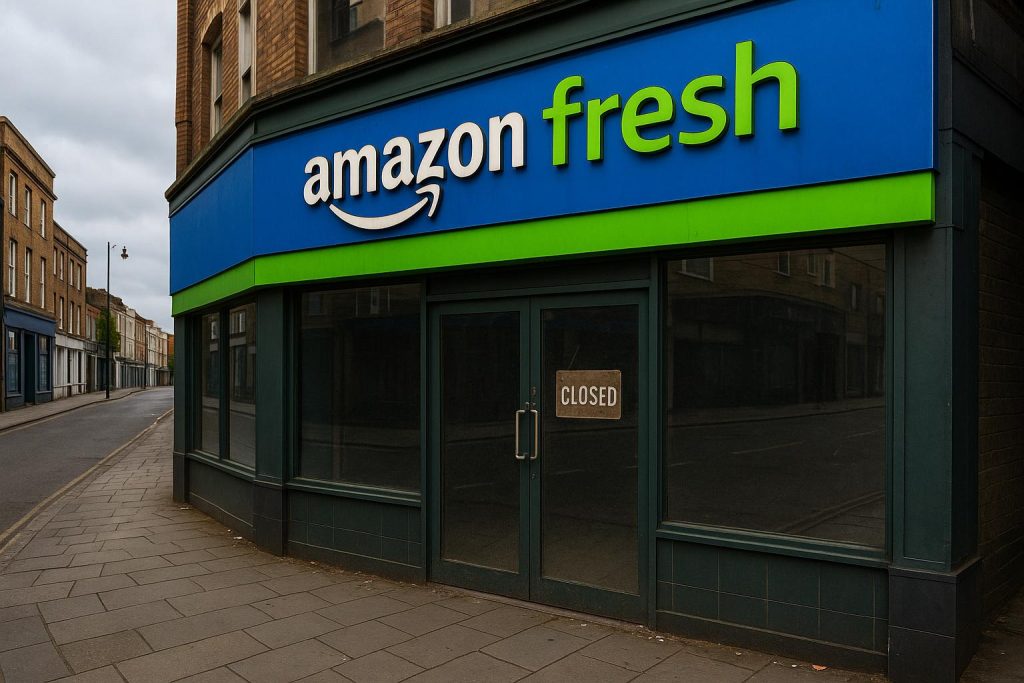Listen to the article
Amazon is to close all 19 Amazon Fresh stores in the UK, shifting its strategy towards online grocery delivery and technology-driven innovations as it faces stiff competition and market challenges.
Amazon’s ambitious grocery retail experiment in the UK, launched in 2021 with the debut of its Amazon Fresh stores, is coming to an end as the company plans to close all 19 physical Fresh locations. This decision marks a significant retreat from its original target of establishing over 200 stores by 2025, illustrating the challenges the US retail giant has faced adapting its business model to the competitive British grocery market. The closure plan includes converting five stores into Whole Foods Market locations, refocusing efforts on Amazon’s more established upscale grocery brand. Industry analysis suggests that Amazon’s emphasis on advanced technology, such as its Just Walk Out cashierless shopping system, was not enough to surmount the UK market’s entrenched competition and consumer preferences during a sustained cost-of-living crisis.
Amazon’s Just Walk Out technology initially represented an innovative approach to in-store shopping, allowing customers to pick up items and leave without traditional checkouts, billed through their Amazon accounts. Despite being installed in numerous locations across the US, UK, and beyond, the UK venture struggled with limited market share, under 1%, and failed to build the scale originally envisioned. Amazon’s grocery leadership cited the need to pivot towards its online grocery delivery service, which is seeing stronger customer demand. The company is expanding same-day delivery of perishables and broadening partnerships with established UK grocers such as Morrisons, Co-op, Iceland, and Gopuff. This strategic shift comes amid broader challenges within the grocery sector where online sales, currently at around 13.4% of total UK grocery spend, are growing but remain below some optimistic projections of 25% by 2030.
Meanwhile, the UK grocery sector is undergoing significant technological transformation. Asda, for instance, has recently extended its partnership with Microsoft in what is touted as one of the country’s largest retail technology deals. Asda’s cloud-first strategy leverages Microsoft Azure to underpin critical areas including data, analytics, security, and system integration. The retailer utilises advanced AI capabilities through Microsoft’s Copilot and Azure Databricks to enhance how it analyses customer data and manages pricing and assortment strategies. This approach allows Asda greater agility in responding to shifting consumer trends and strengthens its proposition amid intensifying market competition. Asda’s Chief Digital Officer, Matt Kelleher, highlights the importance of trusted partners and a flexible technological ecosystem to focus on retailing and customer data utilisation efficiently.
Amazon’s withdrawal from the Fresh stores is also part of a wider recalibration of its grocery ambitions globally. While it has scaled back its Fresh and cashierless Go stores in the US, it maintains a robust presence with over 500 Whole Foods locations and has launched a mini ‘daily shop’ format in urban areas like New York City. In Europe, Amazon continues to promote its Just Walk Out technology, recently introducing it in France at a new restaurant concept, underscoring the company’s commitment to expanding cashierless innovations beyond retail groceries and into varied consumer settings such as restaurants, cultural venues, and airports.
The closure of Amazon Fresh stores in the UK comes just months after Marks & Spencer’s Chief Digital and Technology Officer Rachel Higham exited the company following a costly cyber attack that disrupted the retailer’s systems and supply chain. The event underscores the broader vulnerabilities and pressures facing the retail sector as it embraces digitalisation at scale. Against this backdrop, partnerships like Asda’s with Microsoft, and innovations such as Morrisons’ upcoming rollout of AI-powered smart trolleys, signal an industrious push by UK retailers to balance cutting-edge technology adoption with resilient operational strategies.
Amazon’s strategic shift focuses on harnessing online grocery delivery growth, leveraging faster and more convenient service offerings. It acknowledges the challenges inherent in the UK’s grocery landscape and signals an evolving phase where physical store formats may be less central than seamless digital and delivery experiences. As the UK retail food sector continues its rapid digital transformation, competition among grocers intensifies not only in pricing and assortment but increasingly through technology-driven customer experience enhancements.
📌 Reference Map:
- – Paragraph 1 – [1], [2], [3], [4], [6]
- – Paragraph 2 – [1], [2], [3], [5], [6]
- – Paragraph 3 – [1], [2], [7]
- – Paragraph 4 – [1], [4]
- – Paragraph 5 – [1], [5], [7], [6]
- – Paragraph 6 – [1], [5], [7], [6]
Source: Fuse Wire Services


